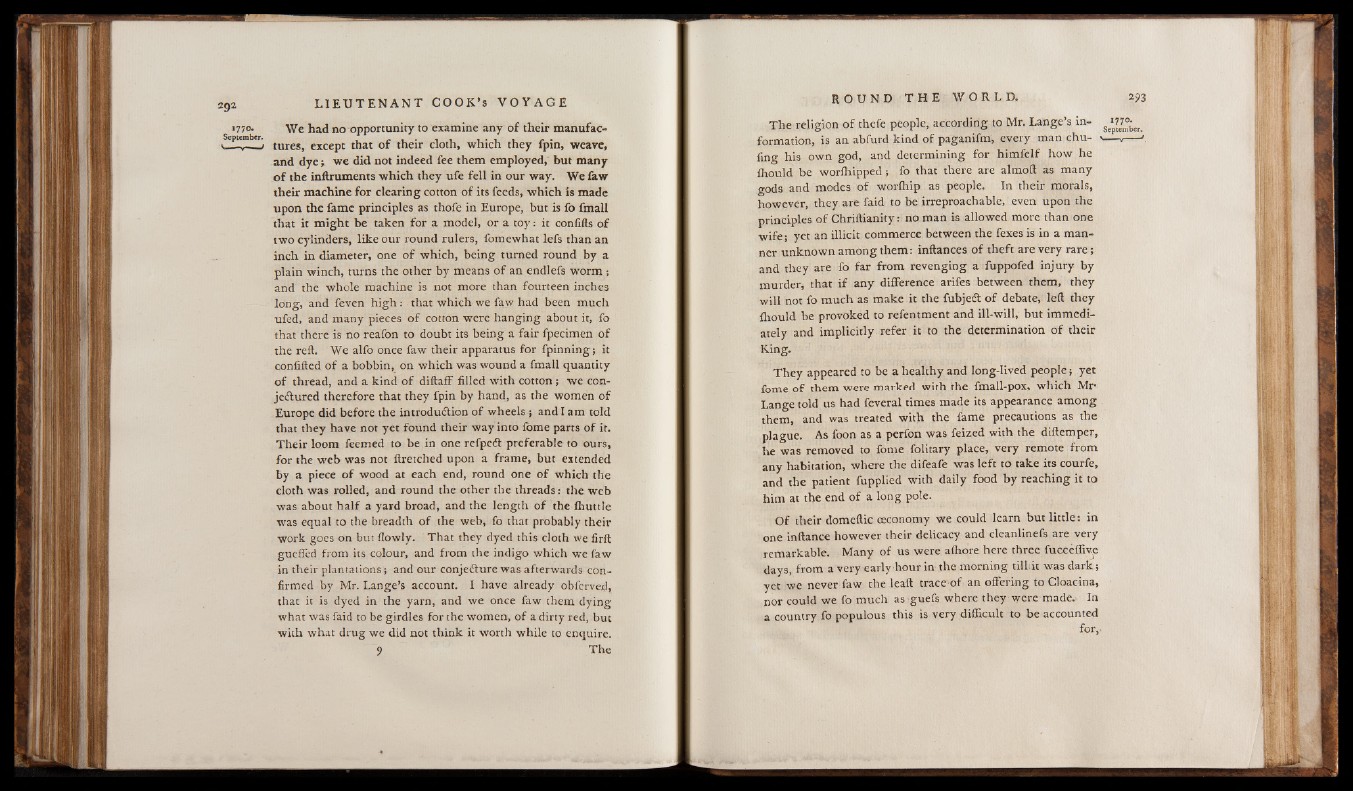
1770. We had no opportunity to examine any of their manufac-
L-y—Jj tures, except that of their cloth, which they fpin, weave,
and dye; we did not indeed fee them employed, but many
of the inftruments which they ufe fell in our way. We faw
their machine for clearing cotton of its feeds, which is made
upon the fame principles as thofe in Europe, but is lo fmall
that it might be taken for a model, or a toy: it conlills of
two cylinders, like our round rulers, fomewhat lefs than an
inch in diameter, one of which, being turned round by a
plain winch, turns the other by means of an endlefs worm ;
and the whole machine is not more than fourteen inches
long, and feven high : that which we faw had been much
ufed, and many pieces of cotton were hanging about it, fo
that there is no reafon to doubt its being a fair fpecimen of
the reft. We alfo once faw their apparatus for fpinning; it
confifted of a bobbin, on which was wound a fmall quantity
of thread, and a kind of diftaff filled with cotton ; we conjectured
therefore that they fpin by hand, as the women of
Europe did before the introduction of wheels ; and I am told
that they have not yet found their way into fome parts of it.
Their loom feemed to be in one refpeCt preferable to ours,
for the web was not ftretched upon a frame, but extended
By a piece of wood at each end, round one of which the
cloth was rolled, and round the other the threads: the web
was about half a yard broad, and the length of the Ihuttle
was equal to the breadth of the web, fo that probably their
work goes on but flowly. That they dyed this cloth we firft
guefled from its colour, and from the indigo which we faw
in their plantations; and our conjecture was afterwards confirmed
by Mr. Lange’s account. I have already obferved,
that it is dyed in the yarn, and we once faw them dying
what was faid to be girdles for the women, of a dirty red, but
with what drug we did not think it worth while to enquire.
9 The
The religion of thefe people, according to Mr. Lange’s information,
is an abfurd kind of paganifm, every man chu- j---------1
fing his own god, and determining for himfelf how he
fhould be worffiipped; fo that there are almoft as many
gods and modes of worftiip as people. In their morals,
however, they are faid to be irreproachable, even upon the
principles of Chriftianity: no man is allowed more than one
wife; yet an illicit commerce between the fexes is in a manner
unknown among them: inftances of theft are very rare;
and they are fo far from revenging a fuppofed injury by
murder, that if any difference arifes between them, they
will not fo much as make it the fubjeCt of debate, left they
fhould be provoked to refentment and ill-will, but immediately
and implicitly refer it to the determination of their
King.
They appeared to be a healthy and long-lived people; yet
fome of them were marked with the fmall-pox, which Mr-
Lange told us had feveral times made its appearance among
them, and was treated with the fame precautions as the
plague. As foon as a perfon was feized with the diftemper,
he was removed to fome folitary place, very remote from
any habitation, where the difeafe was left to take its courfe,
and the patient fupplied with daily food by reaching it to
him at the end of a long pole.
Of their domeflic ceconomy we could learn but little: in
one inftance however their delicacy and cleanlinefs are very
remarkable. Many of us were afhore here three fucceffive
days, from a v e r y early hour in the morning tiffin was dark;
yet we never faw the leaft trace of an offering to Cloacina,
nor could we fo much as guefs where they were made.. In
a country fo populous this is very difficult to be accounted
for,.